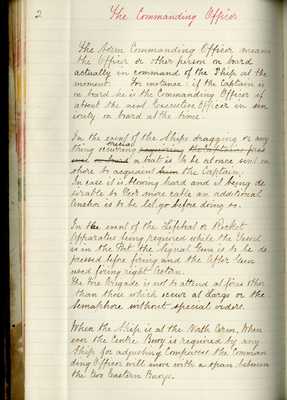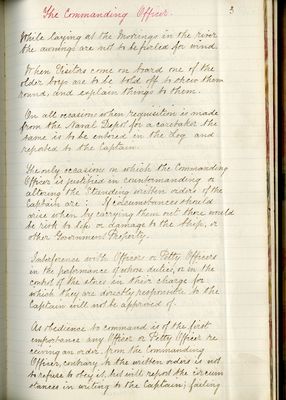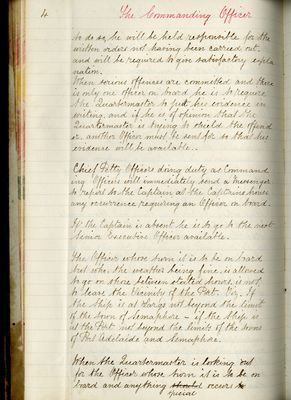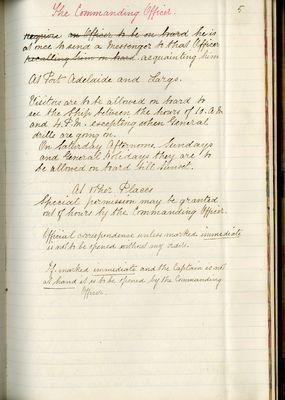Pages
Page 1
2 The Commanding Officer
The term Commanding Officer means the Officer or other person on board actually in command of the Ship at the moment. For instance: if the Captain is on board he is the Commanding Officer if absent the next Executiver Officer in sen iority on board at the time.
In the event of the Ships dragging or any thing special occurring [(all following text struck out) requiring the Captains pres ence on board] a boat is to be at once sent on shore to acquaint [following word struck out) him] the Captain. In case it is blowing hard and it being de sirable to veer more cable an additional Anchor is to be let . go before doing so.
In the event of the Lifeboat or Rocket Apparatus being required while the Vessel is in the Port. the Signal Gun is to be de pressed before firing and the After Gun used firing right astern. The Fire Brigade is not to attend at fires other than those which occur at Largs or the Semaphore without special orders.
When the shipis at the North Arm, When ever the Centre Buoy is required by any Ship for adjusting Compasses. the Comman ding Officer will move with a span between the two Eastern Buoys.
Page 2
The Commanding Officer 3
While laying at the mooring in the river the awnings are not to be furled for wind
When Visitors come on board one of the older boys are to be [told] off to show them round and explain things to them.
On all occasions when requistion is made from the Naval Depot for a caretaker the same is to be entered in the Log and reported to the Captain.
The only occasions in which the Commanding Officer is justified in countermanding or altering the Standing written orders of the Captain are: If circumstances should arise when by carrying them out there would be risk to life or damage to the Ship, or other Government Property.
Interference with Officers or Petty Officers in the performance of whose duties , or in the context of the stores in their charge for which they are directly responsible to the Captain will not be approved of.
As obedience to commande is of the first imporatnace any Offier or Petty Officer re ceiving and order, form the Commanding Officer, contrary to the written orders is not to refuse to obey it but will report the circum stances in writing to the Captain: failing
Page 3
4 The Commanding Officer
to do so, he will be held responsible for the written orders not having been carried out. and will be required to give satisfactory expla nation. When serious offences are committed and there is only one officer on board he is to require the Quartermaster to put his evidence in writing. and if he is of opinion that the Quartermaster is trying to shield the offend er. another Officer must be sent for sp that his evidence will be available..
Chief Petty Officers doing duty as Command ing Officers will immediately send a messenger to report to the Captain at the Captains house any occurrence requiring an Officer on board.
If the Captain is absent he is to go to the next Senior Executive Officer available.
The Officer whose turn it is to be on board but who, the weather being fine, is allowed to go on shgore between stated hours. is not to leave the Vicinity of the Port. Viz. If the Ship is at Largs not beyond the limit of the town of Semaphore - if the Ship is at the Port not beyond the limits of the towns of Port Adelaide and Semaphore.
When the Quartermaster is looking out for the Officer whose turn it is to be on board and anything [should - struck out] special occurs [to - struck out]
Page 4
The Commanding Officer 5
[(all following words struck out) require an Officer to be on board] he is at once to send a Messenger to that Officer [(following words struck out) recalling him on hand]. acquainting him
At Port Adelaide and Largs.
Visitors are to be allowed on board to see the Ship between the hours of 10.AM and 4.P.M. excepting when General drills are going on. On Saturday Afternoons, Sundays and General Holidays they are to be allowed on board till Sunset.
At other Places Special permission may be granted out of hours by the Commanding Officer.
Officiual correspondence unless marked immediate [underlined] is not to be opened without my orders.
If. marked immediate [underlined] and the Captain is not at hand [at hand underlined] it is to be opened by the Commanding Officer.
Page 5
The Master at Arms 7
The Master at Arms is to have Military Command and will take Command next below the Warrant Officers.
He is to be on board on Sunday After noons and any other time the Senior Executive Officer considers it desirable.
He is to take turns with other executive Officers in taking charge of the Ship at Night time.
He is to keep the defaulters Book and Leave Book and to report to the Senor Executive Officer any ommission or irreg ularity in any punishment awarded that he may observe - especially in leave breaking.
All punishments inflicted of whatever nature are to be inserted in the defaul ters. Book.
The rough Defaulters Book is to be placed in the Captains Cabin every Friday Forenoon.
Defaulters are not to be brought before the Captain. until the following day so that on which the investigation has been held by the Senior Executive Officer and the charge sheet is to be presented to




